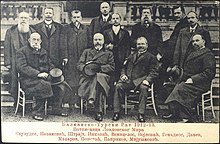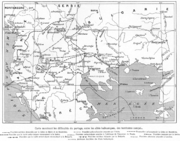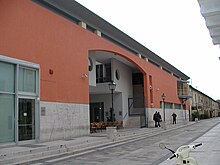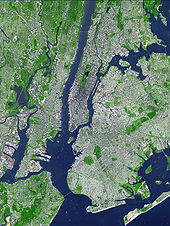1912~1913년 런던 회의
London Conference of 1912–1913 발칸 국가의 대표자 | |
| 날짜. | 1912년 9월 ~ 1913년 8월 |
|---|---|
| 위치 | 영국 런던 |
| 로도 알려짐 | 런던 평화 회의 |
| 유형 | 회의. |
| 모티프 | 영토 획득과 관련하여 전쟁 중인 열강들 사이에서 중재하고 알바니아의 미래를 결정하기 위해 |
| 참가자 | |
| 결과 | 알바니아 공국 수립 |

1912-1913년 런던 회의(London Conference) 또는 런던 평화 회의(London Peace Conference) 또는 대사 회의(Ambaders Conference of the Ambaders)라고도 알려진 이 회의는 당시 6대 강국(오스트리아-헝가리, 프랑스, 영국, 독일, 이탈리아, 그리고 러시아)는 1912년 제1차 발칸 전쟁에서 오스만 제국에 대항한 발칸 동맹군의 성공으로 인해 소집되었습니다. 특히, 이 회의는 영토 획득과 관련하여 전쟁 중에 독립이 선언된 알바니아의 미래를 결정하기 위한 것이었습니다.
역사
1912년 12월 3일 제1차 발칸 전쟁을 끝내기 위한 휴전 협정이 체결되었습니다. 런던 평화회의에는 오스만 제국뿐만 아니라 이전 휴전협정에 서명하지 않은 발칸 동맹국(그리스 포함) 대표단이 참석했습니다.
이 회의는 1912년 9월 성 제임스 궁에서 에드워드 그레이 경의 의장 하에 시작되었습니다.[1] 이후 [2]회의는 1912년 12월 16일에 시작되었으나 1913년 1월 23일 오스만 제국의 쿠데타로 막을 내렸습니다. 쿠데타 지도자 엔베르 파샤는 회의에서 오스만 제국을 철수시켰습니다.
1913년 5월 30일, 회의는 오스만 제국이 참석하지 않은 상태에서 런던 조약(1913년)에 서명했습니다. 1913년 7월 29일, 대사들은 오스만 제국으로부터 독립된 주권 국가로서 알바니아 공국을 설립하기로 공식적인 결정을 내렸습니다.[3]
그리스와 세르비아의 압력으로 인해 새로 설립된 알바니아 국가가 주장하는 영토의 절반, 전체 알바니아 인구의 30%[4]에서 40% 사이에서 결정되었습니다. 알바니아 공국은 신설된 알바니아 공국에서 제외되었고, 특히 코소보 빌라예트 지역은 세르비아와 남부 차메리아의 대부분이 그리스에 속하게 되었습니다.[5] 그리스-알바니아 국경에 대해서는 12월 3일 그리스 해군이 마을을 포격한 이후 오스트리아-헝가리와 이탈리아가 그리스의 ë 점령을 금지한 것이 유일한 개입이었습니다.
그리스-알바니아 국경을 묘사하기 위해 특별 경계 위원회가 파견되었습니다. 그러나 민족지학적으로 이 지역을 묘사할 수 없었기 때문에 경제적, 전략적, 지리적 주장에 밀려 런던 회의는 분쟁 지역의 대부분을 알바니아에 양도하기로 결정했습니다. 이 사건의 전환은 북부 에피루스 자치 공화국을 선포한 그리스 지역 주민들 사이의 봉기를 촉진시켰습니다.[7]
아로마니아인들의 상황도 논의됐습니다. 아로마니아인은 발칸 반도 전역에 흩어져 있는 작은 민족입니다. 런던 회의에서는 그리스와 세르비아(세르비아가 바르다르 마케도니아를 합병한 것처럼) 동화 정책으로부터 보호하기 위해 핀두스와 그 주변 지역을 포함한 아로마니아인들이 거주하는 모든 땅을 새로운 알바니아 국가에 양도할 것을 제안했습니다. 그러한 제안들은 루마니아 왕국에 의해 지지를 받았습니다. 동시에 열린 트리에스테 알바니아 의회에서도 아로마니아인들은 알바니아 내의 지역 자치를 요구했지만, 알바니아의 새로운 고정 국경 내에서 확장 제안을 제외한 아로마니아인들이 조밀한 지역에 거주하지 않음에 따라 이는 거부되었습니다. 결국 아로마니아인들은 알바니아에 합병되지도 않았고 자치권도 주어지지 않았습니다.[8]
- 회의 기간 동안의 경쟁 영토 주장 및 제안
- 최종 영토 수정이 포함된 지도; 1914년 발칸 전쟁에 관한 국제 위원회 보고서에 게재
참고 항목
참고문헌
- ^ Michael Graham Fry; Erik Goldstein; Richard Langhorne (1 March 200). Guide to International Relations and Diplomacy. Continuum International Publishing Group. p. 144. ISBN 978-0-8264-7301-1. Retrieved 29 May 2012.
- ^ "The Treaty of London, 1913". Archived from the original on 1997-05-01. Retrieved 2008-01-14.
- ^ Elsie, Robert. "The Conference of London". Archived from the original on 17 July 2011. Retrieved 5 January 2012.
- ^ Elsie, Robert (2010), "Independent Albania (1912—1944)", Historical dictionary of Albania, Lanham: Scarecrow Press, p. lix, ISBN 978-0-8108-7380-3, OCLC 454375231, retrieved 4 February 2012,
... about 30 percent of the Albanian population were excluded from the new state
- ^ Bugajski, Janusz (2002). Political Parties of Eastern Europe: A Guide to Politics in the Post-Communist Era. M. E. Sharpe. p. 675. ISBN 978-1-56324-676-0. Retrieved 29 May 2012.
But because of strong pressures from Albania's neighbors, the Great Powers gave the Albanian-inhabited region of Kosova to Serbia and much of the southern Çamëria region to Greece. Roughly half of the predominantly Albanian territories and 40% of the population were left outside the new country's borders.
- ^ Hall, Richard C. (2002). The Balkan Wars 1912-1913: Prelude to the First World War. Routledge. pp. 72–74. ISBN 9781134583638.
The Austrian-Hungarians, however, were not overly concerned about the southern frontiers of Albania. Since they had no conflict with Greece, they were not so vigilant about the future Greco-Albanian frontier. The only time the Austrians and Italians bestirred themselves about the southern frontier of Albania was to forbid a Greek occupation of Vlorë after the Greek navy had shelled the town on 3 December. The Greeks had no Great Power opponent and no Great Power patron to press their interests in southern Albania. The Greek navy imposed a blockade on the Albanian coast, isolating the Albanian Provisional Government in Vlore. As a result, no Great Power made any serious effort in London to deny Janina to the Greeks so long as they could take it.
- ^ Draper, Stark. "The conceptualization of an Albanian nation" (PDF). Ethnic and Racial Studies. Volume 20, Number 1. pp. 4–5. Archived from the original (PDF) on 20 March 2012. Retrieved 2 February 2012.
- ^ Meta, Beqir (2009). "Pakica etno-kulturore vllehe në vitet 1912-1920". Studime Historike (in Albanian) (1–2): 57–76.




